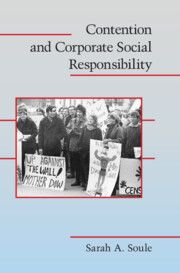Book contents
- Frontmatter
- Contents
- Figures
- Tables
- Preface
- 1 INTRODUCTION
- 2 UNDERSTANDING SOCIAL MOVEMENTS, CONTENTIOUS AND PRIVATE POLITICS, AND THEIR CONSEQUENCES
- 3 ANTICORPORATE PROTEST IN THE UNITED STATES, 1960–1990
- 4 THE EFFECT OF PROTEST ON UNIVERSITY DIVESTMENT
- 5 PRIVATE AND CONTENTIOUS POLITICS IN THE POST-1990 ERA
- 6 CONCLUSION
- Appendix A Description of Data Used in Chapter 3
- Appendix B Modeling Technique Used in Chapter 3
- Appendix C Sources of Data for Analysis in Chapter 4
- Appendix D Modeling Technique Used in Chapter 4
- Bibliography
- Index
2 - UNDERSTANDING SOCIAL MOVEMENTS, CONTENTIOUS AND PRIVATE POLITICS, AND THEIR CONSEQUENCES
Published online by Cambridge University Press: 05 June 2012
- Frontmatter
- Contents
- Figures
- Tables
- Preface
- 1 INTRODUCTION
- 2 UNDERSTANDING SOCIAL MOVEMENTS, CONTENTIOUS AND PRIVATE POLITICS, AND THEIR CONSEQUENCES
- 3 ANTICORPORATE PROTEST IN THE UNITED STATES, 1960–1990
- 4 THE EFFECT OF PROTEST ON UNIVERSITY DIVESTMENT
- 5 PRIVATE AND CONTENTIOUS POLITICS IN THE POST-1990 ERA
- 6 CONCLUSION
- Appendix A Description of Data Used in Chapter 3
- Appendix B Modeling Technique Used in Chapter 3
- Appendix C Sources of Data for Analysis in Chapter 4
- Appendix D Modeling Technique Used in Chapter 4
- Bibliography
- Index
Summary
In a recent synthetic discussion of two of the most active areas of sociological inquiry – organizational studies and social movement studies – McAdam and Scott (2005) show that there is a great deal to be learned by crosspollination between these two distinct areas. One key area of inquiry at this nexus is the consequences that social movements have on corporations. While Zald and Berger (1978) made this observation over three decades ago, it has become an even more critical area of inquiry given the enormous growth in corporate economic and political power alongside the decline in power of regulatory agencies of the government and organized labor (as I discussed in Chapter 1). As I noted in the previous chapter, citizen anticorporate activism may be the last remaining way to influence corporate behavior and by all indicators, this type of activism shows no evidence of waning (Galbraith 1952; Yaziji and Doh 2009).
If scholarship on this topic is accurate, in the past few decades there has been an increase in activism directly targeting firms (e.g., Vogel 1978; Doh and Teegan 2003). For example, as I discuss in Chapter 5, a number of firms – including Pepsi and Unocal – have been targeted because of their investments in Burma (Spar and La Mure 2003). Nike has been targeted by a number of different social movement organizations because of its alleged mistreatment of workers in foreign factories, a campaign that I also discuss in Chapter 5.
- Type
- Chapter
- Information
- Contention and Corporate Social Responsibility , pp. 29 - 52Publisher: Cambridge University PressPrint publication year: 2009



